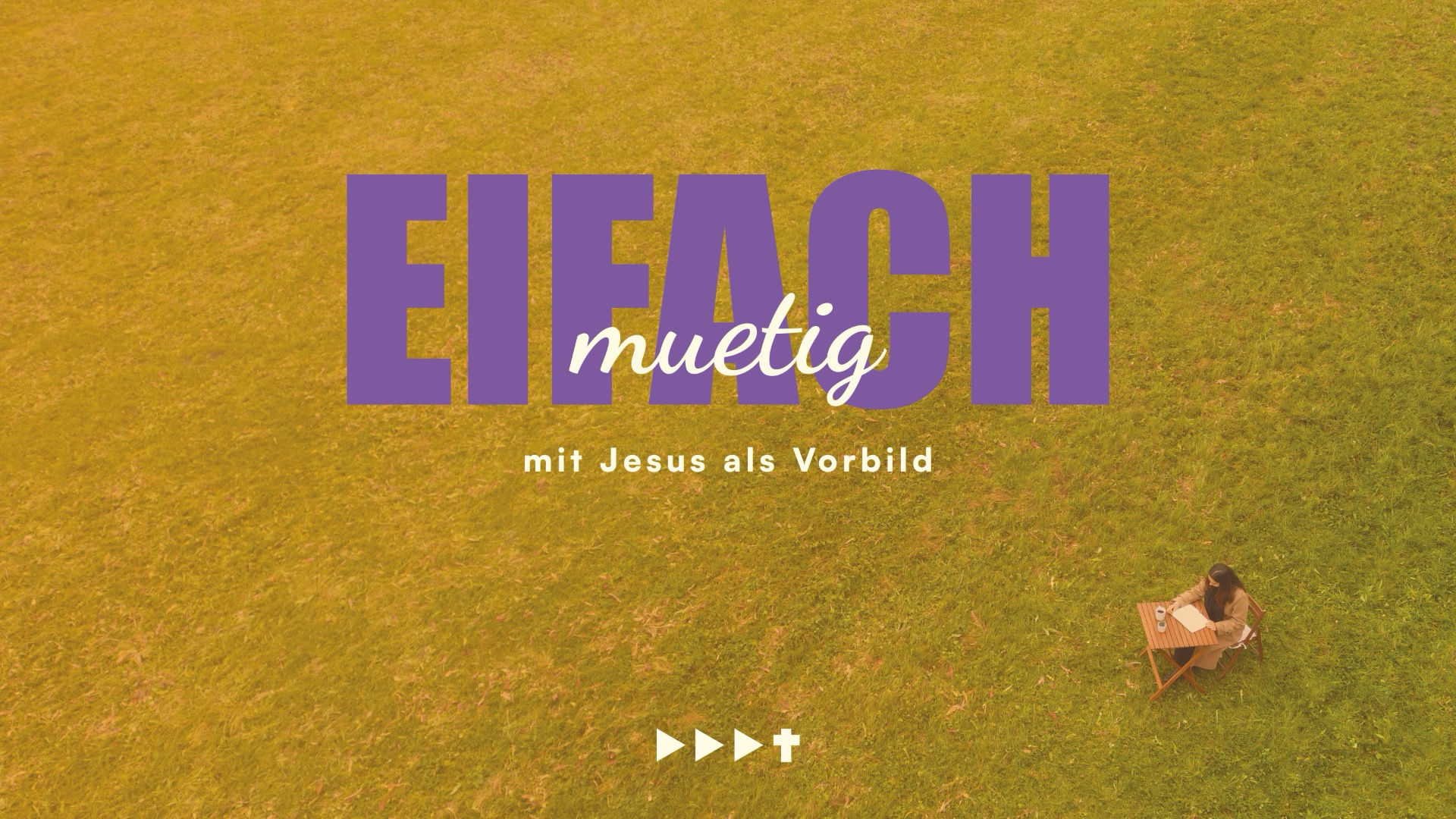Creation & Faith | Proclaiming the good news to all creation
Series: EIFACH muetig – with Jesus as a role model | Bible text: Mark 16:15; Genesis 1:26–27; 2:15
The calling of human beings is to reflect God’s sovereign rule and wisdom into the world and to return the praise of all creation to God. This sermon explores the question of how we humans, as images of God, should behave in a socially, ecologically and economically just way in the creation entrusted to us. This much can be revealed: It is not about performance by our own efforts, but about being a mirror for God’s glory in this world.
The calling of man is to reflect God’s glory, his sovereign rule and wisdom in the world – and to carry the praise of creation back to God. The last sermon was about joining in the praise of creation. When John is allowed a glimpse into the invisible reality of God in Revelation, he writes: «And I heard every creature in heaven and on earth and under the earth and in the sea say, «To him who sits on the throne and to the Lamb be praise and honour and glory and power for ever and ever!» (Revelation 5:13 NLB).
Today we ask ourselves: How can we as human beings reflect God’s glory in creation? Or, in the words of Jesus: «Go into the whole world and proclaim of all creation the Gospel!» (Mark 16:15 New Testament). St Francis of Assisi lived this message literally. His deep connection to nature and animals is legendary – for example in the story in which he preaches to the birds and calls on them to praise God. But what does that mean for us in concrete terms?
Created in God’s image
The answer is already in the first chapter of the Bible: «Then God said: «We will create people in our image and likeness. They shall rule over the fish of the sea, the birds of the sky, all livestock, wild animals and all creeping things. So God created mankind in his own image, in the image of God he created them, male and female he created them. And God blessed them and gave them the command: «Be fruitful and multiply, populate the earth and take possession of it. Rule over the fish of the sea, the birds of the air and all the animals of the earth.» (Genesis 1:26–28 NLB).
Man is not God, but created in his image – to point to him. In ancient times, images of gods were erected in temples – made of stone, wood or metal. The Bible rejects this practice because: Only a living person can reflect the living God.
Later, the Roman emperors also erected statues of themselves in the various provinces so that the local people knew who their ruler was. The images were a way of projecting dominance into the wider world. All people – regardless of their background, status or social milieu – are called to reflect God’s wise rule in His world.
The perfect image of God was Jesus: «Christ is the image of the invisible God […]» (Colossians 1:15 NLB). He represented His heavenly Father with every fibre of His being. The reason for this clear mirror is described immediately afterwards: «For God wanted to dwell in Christ in all his fullness. Through him, he reconciled everything with himself. Through his blood on the cross, he made peace with everything in heaven and on earth. You are also included in this» (Colossians 1:19–21 NLB). The influence of Jesus, as the image of the invisible God, on creation was enormous, nothing less than the reconciliation of all creation. HE is the human image that reveals the Father.
In the New Testament, the image of God is described with three characteristics. The same language is deliberately used as in Genesis 1. Three characteristics are at the heart of this image:
- Knowledge of God (Colossians 3:10): an intimate relationship, not mere knowledge.
- True holiness (Ephesians 4:24): an identity that God gives us.
- Justice (Ephesians 4:24): living faith in everyday life – socially, ecologically and economically. It means putting holiness into practice.
Man was created to know God, to be holy and to act justly. Righteous behaviour is a fruit of a person knowing God personally and receiving a new identity from Him. Now, when we talk about sustainable living and socially just behaviour, I am not referring to any great human achievement, but simply to the radiance of God’s glory as the fruit of a new identity. Edith Stein (1891–1942): «You should be like a window through which God’s goodness can shine into the world.»
Being stewards of God’s creation
Four different verbs are used in the creation account for man’s cultural mission. In the biblical passage quoted above (Genesis 1:28), the term Taking possession of the earth and the Rule over the animals the speech.
- Take possession of the earth (kavash): The Hebrew word means submit or bring under control. In the context of Genesis 1:28, it describes the divine mandate to man to rule responsibly over the earth, not to rule it ruthlessly. People should actively take possession of the earth and organise it in the knowledge that they are guests on this earth. When God instituted the Sabbath for the land and the year of remission – both instructions for socially just, ecological and economic action – He justified this with the following words: «The land must not be sold forever, because it belongs to me. You are only strangers and guests living in my land» (Leviticus 25:23 NLB).
- To rule over the animals (radah)The Hebrew word is also used in connection with the work of a shepherd. Man has the task of guiding the animals in a caring manner and not to rule over them by force. «The righteous man has mercy on his cattle, but the heart of the wicked is cruel» (Proverbs 12:10 SLT). Overall, the Bible shows that the consumption of animals is permitted as long as it is done in accordance with the given regulations and respect for creation. In Jewish Bible commentaries, it is noticeable that they are very great value on moderation, respect and responsibility lay.
These two verbs are supplemented by two others from the second creation account: «The LORD God brought man into the Garden of Eden. He was to cultivate and preserve»(Genesis 2:15 NLB).
- Build on (avad): Further translations: work, serve. In the agricultural context, this means avad cultivate or cultivate – i.e. actively work, care for and utilise the earth in a servant attitude.
- Preserve (shamar): Further translations: guard, pay attention to, observe, protect, monitor. It is the central word in Psalm 121 and appears there six times. This repetition reinforces the message of the psalmGod is the faithful guardian who constantly watches over and protects his people. Here is a sample: «The LORD sheltered you from all harm and preserved your life. The LORD sheltered you, when you come and when you go, from now until eternity» (Psalm 121:8 NLB). Just as God watches over our people and protects us, we should do the same for creation.
These four verbs show: Our task is servant care – not domination for self-aggrandisement. The challenge is not just for farmers, but for everyone. Aargau theologian Thomas Härry says: «As a consumer, I am a farmer, producer, employer and payer of wages, and I play an active and responsible role in shaping how this world and its creatures are treated.» We all have a lever that we can pull when we consume. The most effective approach is probably moderation, a life of simplicity.
What is the point of all this?
We often hear: «What is the point of my efforts if world powers don’t care?» A story provides an answer: A father sees his son throwing starfish into the sea on the beach. «What’s the point?» he asks. «There are thousands of them!» The boy replies and throws another star into the water: «It makes a difference for this one.» This is how God’s kingdom works: small, inconspicuous, symbolic, but full of meaning. Jesus, the personified kingdom of God, limited his ministry to a small strip of land in the Middle East between the Jordan River and the Mediterranean Sea. Although only a few people accept Jesus» offer of salvation, huge efforts are being made by missionary organisations to reach all the people of the world with the good news. For the person who accepts Jesus Christ as his Lord and Saviour, it makes a huge difference. And our treatment of creation also counts – not what Trump or Jinping do, but what we take responsibility for. It is not our job to save the world. Jesus Christ will do that on the day of his return. As followers of Jesus Christ, however, we want to show signs of the new creation now. The kingdom of God is in the area of tension between already now and not yet.
God has placed us in this world in his image – not as mere users, but as faithful stewards of his creation. Every breath, every act of care, every conscious decision in favour of justice, sustainability and love is a reflection of his glory in the world. We are called to be like windows through which God’s light and goodness can shine into an often dark world. Perhaps your contribution seems small – a conscious purchasing decision, a kind treatment of nature, a prayer for change. But this is precisely where the power of the kingdom of God is revealed: in the small, in the hidden, in the faithful. Because for «this one starfish» it makes a difference. And for God too.
So let us go forth trusting in Christ, the perfect image of God – in love, in humility and with a firm resolve to proclaim his good news to all creation. Not out of duty, but as an expression of our identity: beloved children of God, created for the praise of his glory.
Possible questions for the small groups
Choose the questions that suit your group.
- What does it mean for you personally to be «God’s image» in the world? Which aspects of this «image» – such as knowledge of God, holiness or justice – are particularly challenging you at the moment?
- How can you concretely reflect God’s glory in your everyday life – in your job, your family or in your dealings with creation? Are there small, concrete steps that you would like to take in the coming weeks?
- What do you think about the idea that humans are ’stewards» of creation? In which areas of your life do you feel responsible – or overburdened – in dealing with the environment, animals or resources?
- How do you deal with the feeling that your contributions to a just, sustainable life «don’t make a difference»? What role does your faith or trust in God’s kingdom play in this?
- What does it mean to you to proclaim the gospel to «all creation»? Can this be done without words? If so, how?





